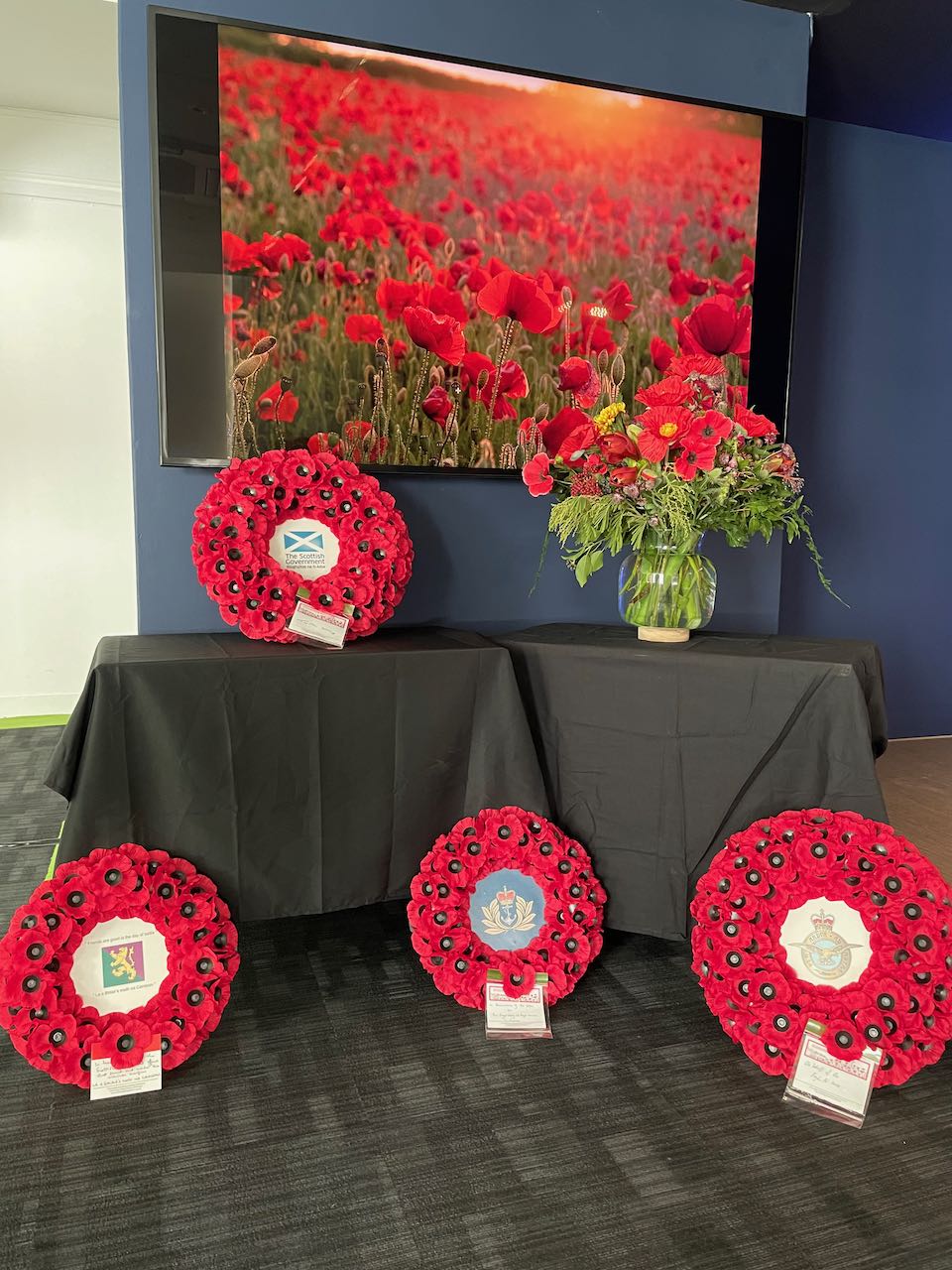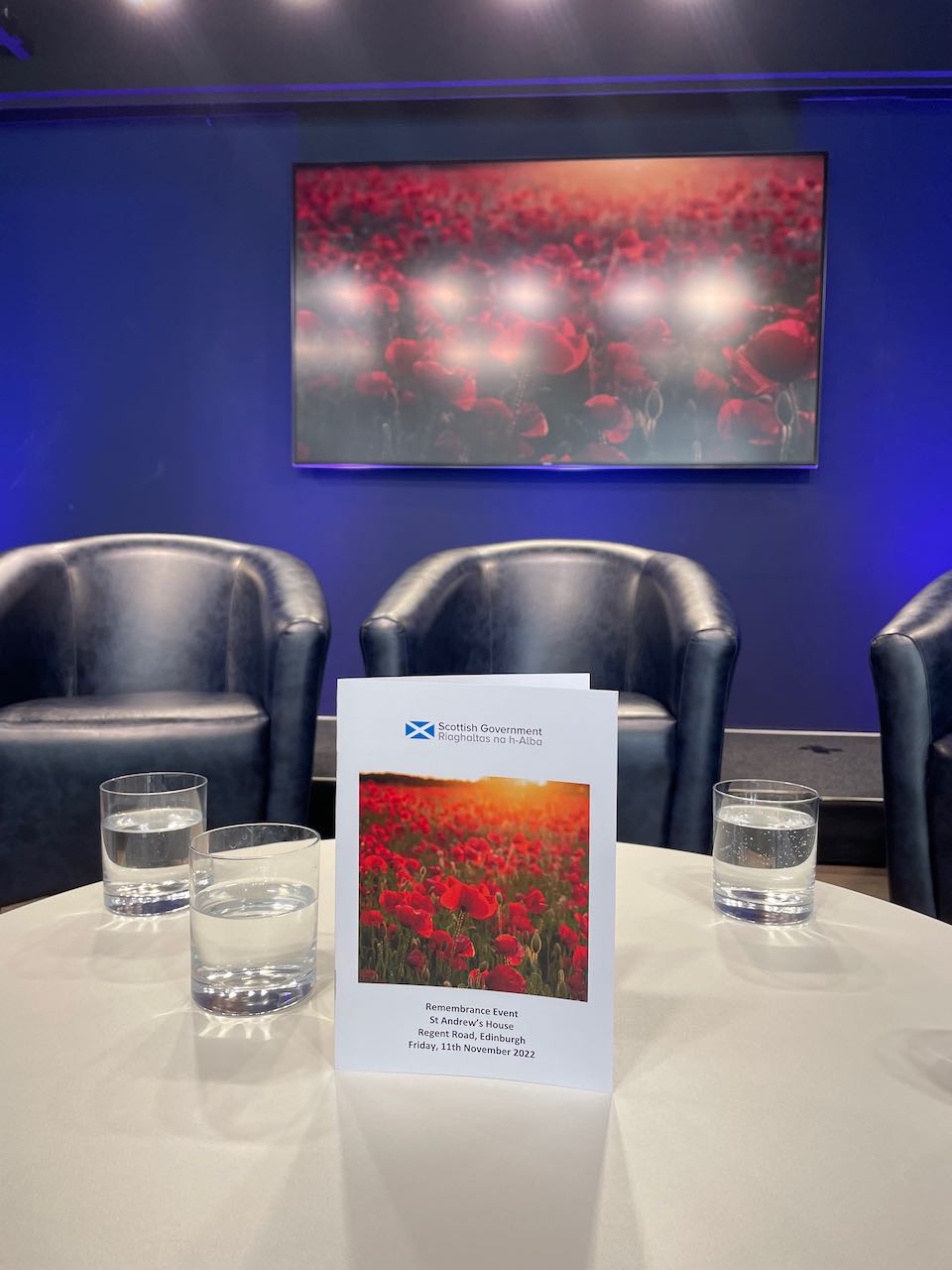I was honoured to be invited yesterday, along with Ameed Versace of the Scottish Ahlul Bayt Society and the minister of St Giles’ Cathedral, the Reverend Calum MacLeod, to give a reflection at the Remembrance Day ceremony at St Andrews House where we were joined by representatives of the Armed Forces who laid wreaths in memory of the fallen of two world wars.

The ceremony was led by by John-Paul Marks, the Permanent Secretary to the Scottish Government, who read us the poem ‘In Flanders Field’, which was written after the Second Battle of Ypres in 1915 by a Canadian army doctor, Lt Col John McCrae who was working there as a field hospital surgeon, and it was brought to a poignant end by Pipe Major John Rae of the Scots Guards, who played The Flowers of the Forest, the timeless lament composed for the fallen of Flodden Field in 1513.

This was my reflection.
What have we learned since people first got together to remember “the war to end all wars”? The answer, clearly, is “not enough”. As Sir Edward Grey famously remarked on its outbreak, “The lamps are going out all over Europe; we shall not see them lit again in our life-time.”
Humanism is a simple philosophy; it asks us to try to think for ourselves and try to be kind. As a humanist, I generally try to see the glass half full, rather than half empty, but I have to admit that’s been something of a challenge of late.
In 1914, the western world was living in an era of unparalleled peace and prosperity. It was called “the Gilded Age” but it ended in one of the most destructive wars in human history. Many historians also describe it as the stupidest conflict in human history and that stupidity is summed up by what happened on Armistice Day itself.
Although the armistice was signed just after five in the morning, it wasn’t put into effect until eleven, so the fighting continued and during the last six hours of the war, thousands of people were killed or injured for no political or military reason whatever. To put it into context, more people died on Armistice Day in World War I than on D Day in World War II. The Great War ended as senselessly as it had begun.
The UK’s longest serving Foreign Secretary, Sir Edward Grey was one of the people who tried to ensure that the First World War really was “the war to end all wars”. In 1918, he became the President of the League of Nations, which didn’t survive the Second World War, and was replaced by the United Nations. They’re not doing too well either, but as the Irish playwright, Samuel Beckett wrote, “Ever tried? Ever failed? No matter. Try again. Fail again. Fail better.”
As Barack Obama said the other day, “despair is not an option”. We need to keep trying.
Some of you may remember a Disney movie called The Sword in The Stone. It was based on a book written in the late 1930’s by a schoolteacher called TH White and although aimed at children, it was written very much with the coming Second World War in mind.
In the Middle Ages, force was the only way to solve political disputes; ‘might was right’ and the strongest man won. White recognised that humanity is eternally torn between war and peace, so when he rewrote the legend, he gave King Arthur a new backstory as a way of thinking about the proper uses of violent force.
The infant Arthur is left on the doorstep of a castle where he’s raised by a knight called Sir Ector as a companion to his son Kay, and it’s Kay who gives Arthur the unkind nickname of ‘the Wart’. The only person who knows Arthur’s true identity is the magician Merlyn, who White recasts as the boys’ tutor, and Merlyn teaches the Wart everything a king needs to know by turning him into all kinds of birds and beasts, including an ant and a goose.
The Sword in the Stone is a charming, funny and joyful story, but it’s also an extended political allegory. The world of the ants is a totalitarian one. Everything not compulsory is forbidden, and the ants of one nest wage war upon the ants of another. By contrast the migratory geese, to whom national boundaries mean nothing at all, are peace-loving and kind. The Wart loves his time with the geese, but the ants make him sick to his stomach.
The Wart dreams of growing up to become a knight, but when he realises that’s never going to happen, he is heartbroken. To cheer him up, Merlyn transforms him one last time and sends him off to visit the badger, who gives him not so much an adventure as a lecture, at the end of which he asks the Wart if he’s realised yet that man is almost the only animal which wages war?
‘Ants do,’ replies the Wart, but the badger gently explains to him that of the more than 4,000 species of ant, only 5 are belligerent. He also points out that there are even some human beings who don’t wage war, like the Lapps and other nomads who don’t claim boundaries. “True warfare,” says the badger, “is rarer in Nature than cannibalism. Don’t you think that is a little unfortunate?’
The Wart is not convinced. ‘Personally, I should have liked to go to war if I could have been made a knight,” he says. “I should have liked the banners and the trumpets, the flashing armour and the glorious charges. And oh, I should have liked to do great deeds, and be brave, and conquer my own fears. Don’t you have courage in warfare, Badger, and endurance, and comrades whom you love?’
The learned animal thought for a long time, gazing into the fire. In the end, he seemed to change the subject. ‘Which did you like best,’ he asked, ‘the ants or the wild geese?’
Humanists believe there are more things that unite than divide us. As we remember those who gave their lives in the Great War, and every conflict ever since, let us also remember this; and keep trying.

0 Comments Leave a comment